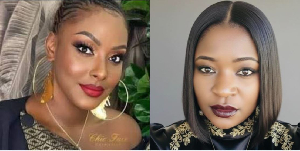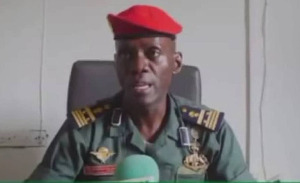If Journalist Elie Smith expected justice after the a vicious attack from suspicious elements at his Brazzaville residence recently, he may never get them as the Congolese authorities added salt to injury by expelling him from the country on September 26.
Known for hard work and professionalism which had contributed to the growing success of the MNTV network, Smith alongside his guard and younger sister were victims of untold barbarity from hoodlums in a well-orchestrated attack earlier in September.
“It is difficult to say whether it was an ordinary armed robbery. But now I am convinced that, it was a punitive sanction against me,” said Elie Smith while trying to figure out who might have ordered the attack. As he meditates on his ordeal in Cameron after his expulsion from Congo, Smith says the initial shock has given way to a firm determination to continue his practice of ethical and professional journalism.
Mr. Smith, you and your sister were recently victims of physical aggression from the Congolese Police what happened?
On the 9th of September, I was one of the guests of a programme called ‘’San Detour’’ broadcast on a privately owned Television called DRTV. The topic of the programme was: Should the largest mosque within the CEMAC sub region be constructed in Brazzaville?
The other members on the panel of the programme presented by Paul Sony Benga who doubles as journalist/presenter and Director of DRTV were; Alphonse Ndongo, journalist, Guy Mafimba, political analyst and El Hajj Djibril Bopaka, head of the Islamic Council of Congo.
The programme ended at mid night and I gave one of my three mobile phones to Alphonse Ndongo to go and charge it in his house. Why? It was simply because, for the past three or four days, there was no power supply in our neighborhood called Batignolles. When we separated, I went to our TV station called MNTV, and spent about an hour and a half. I left my office around 1 am. But on my way home, I stopped at a police control point or check point, located at the ‘’La Corpole’’, police station.
The Armed robbery all began on the early hours of September 10th, between 1h30 am and 2 am, I was already in my room and I overheard a scuffle outside. When, I went to verify, I noticed that, it was my guard fighting or resisting some men in arms who were saying that they wanted to see his boss. I felt that, if I don’t respond, he would be killed and I said, I am in, what do you want? They said they have come to kill me and have money. But I replied that, they can’t have both. You either kill me or you get the money you came to look for.
Then I noticed that, they were putting on rangers or military boots. They took me into my sleeping room and asked me immediately that, they wanted to see my French wife. I replied that, my wife was not French but Peruvian.
I also told them that, I was living here only with my younger sister and my day and night watch. But curiously, they had a telephone and were in communications constantly during the operation.
After taking money, one said they were to take me along with them and kill me. After a brief conversation amongst them they decided to leave me but opted to rape my younger sister. After raping my younger sister, they decided to take us and lock us in my bathroom and they left.
What prompted the aggression, you talked of a report you did, what was it about or what did it contain that such brutality will be meted out on you?
It is difficult to say whether it was an ordinary armed robbery. But now I am convinced that it was a punitive sanction against me. But who commandeered it? That is the question that only an investigation can answer.
I thought it was on the 7th of September, I published online via my facebook page pictures of opposition party militants who were beaten up savagely by Police men in plain cloth. I think, it is what prompted the punitive sanction at my home. But all I also know is that, General Jean Francois Ndenguet who runs a parallel Police unit called or abbreviated GRB has always threatened me and he had done so with other journalists such as Sadio Kante-Morel, Guy Milex Mboundzi and Paul Sony Benga.
General Ndenguet had already warned me that, he will expel me. He was mad at me because I said in an interview that, I want the Police to carry out investigations to find out whether the attack at my home and the rape of my sister may have been commandeered.
I also asked the Police to carry out an investigation to find out with whom the Armed Robbers were in constant conversation with while operating in my house. He was also angry that, the European Union Delegation in Brazzaville, the US Embassy, Reporters without borders, Committee to Protect Journalists reacted by denouncing what happened. He concluded that, I was an agent of foreign forces seeking to destabilize Congo and also that; I uttered seditious statements against the Police.
How is everyone doing now, your Guard, your Sister and yourself?
I am doing fine. I have since been expelled. My sister is also now with us and she is apparently doing fine. She has taken a battery of test and the preliminary results are negative. However, the medical doctors have asked us to conduct another test after three months.
As for my guard, he is in Brazzaville and I don’t know how he is doing, for I no longer have his contacts, for my mobile phone taken by the armed Robbers are now with the Police, whom I hear are trying to carry out expertise investigation to see those I use to communicate with.
Prior to the attack you suffered, had you or any other journalist in Congo suffered such attacks before and may we have an idea on the nature of press freedom in Congo?
There had been some attacks and beating of journalists before, but it was not as violent as it was in my case. I have the case or examples of Davy Mousa, a journalist working with MNTV and his camerawoman by name Sylvie Ndinga. They were beaten up by the guards of the speaker of National Assembly and the Camera of Sylvie destroyed. Mr. Mousa was even locked up for a day at the Poto-poto Gendarmerie station for two days.
As concerns press freedom in Congo, the press is not free. The other journalist beaten up by the Police was Giscard Mahoungou of DRTV. Recently a number of print media outlets have been banned. The only newspapers allowed to exist are those that dance to the tune of the state. And as far as the electronic media is concerned, the owners of Television and radio stations in Congo are either members of the family of the President of the republic or people gravitating around power circle. In fact there is no freedom of the Press in Congo.
In the face of the attacks, when remedies were available to you, is the justice system able to take up the case?
I want to defend myself in court, for I have been accused of uttering seditious comments vis-à-vis the Police and also that, I am working with foreign agents in particular the CIA, to destabilize the state of Congo. I want them or the Police to bring up proves of their allegations. The judicial system is what it is but I want to clear my name.
Curiously it appears your media outlet is owned by a member of President Sassou’s family, what is its editorial line and how may this have contributed to the attack against your person?
Yes, our media group is owned by the elder brother to the President of the Republic. His name is Maurice Nguesso. From the day I began working for them, I told them that, I wanted to be independent and not a propagandist. Our editorial line was or is liberal. I made sure to have balanced opinion. Hence we received both supporters of the majority as well as the opposition. We also carried out investigative journalism, a thing that was not common in Congolese journalism.
I know that, there were some members of the family who were not happy with our openness, but there were equally others who liked the independent spirit. But I don’t think any member of the family ordered the attack other than General Jean Francois Ndenguet who does not like the press or at least the independent Press.
How is the media climate in Congo generally, with private television and radio stations, the government can make the case it has a free press, is the press there free?
I think I have already answered this question. The government might say whatever they may want to say, but the truth is that, The Press is not free in Congo. There is a kind of freedom or what I call ‘’cosmetic press freedom’’.
President Sassou appears to be nursing plans to run for office again though he is barred by constitutional term limits, is this something that Congolese are in support of?
No credible opinion poll has been conducted. But I think the general opinion is that, Sassou Nguesso has so far done a good job in the consolidation of peace and the development of basic infrastructure like roads, hospitals and seaports and some macro economic development.
For his long stay power and considering the resources his country has, how much has he done in terms of moving his country forward, economically, socially and politically?
At macroeconomic level, Congo has improved with an annual average growth rate of 5%. And the government has embarked recently on massive infrastructural development and a policy to develop the hinterland. The government is constructing airports in all the 9 regions with football stadia. And there is a project to build 12 general hospitals at the tune of cfa frs 1 thousand billion.
But the rate of poverty has not reduced and corruption and nepotism are rife. On the political and social aspects, the situation is tense because, it is not open. The opposition is not allowed to express itself on the national media and even on the private media. The only media where they could express themselves was MNTV and there is a lot of intimidation. There is also a risk for social uprising.
What did the attack do to the morale of Elie Smith vis a vis his profession as a journalist?
Well, it really had an impact. But after some days, it instead buoyed my determination to continue my job, for I know, it is risky especially when you want to work professionally.
Actualités of Saturday, 18 October 2014
Source: Pan African Visions













